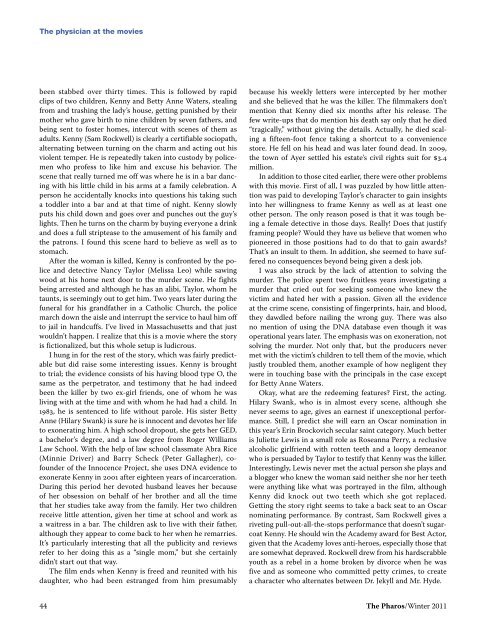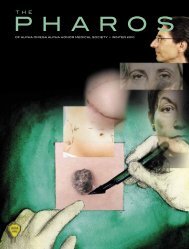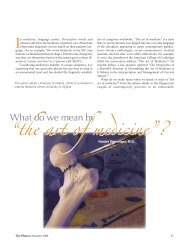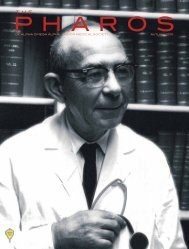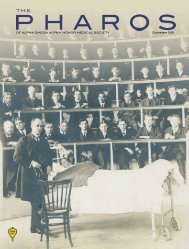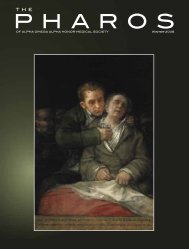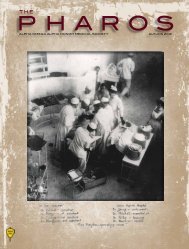Download The Pharos Winter 2011 Edition - Alpha Omega Alpha
Download The Pharos Winter 2011 Edition - Alpha Omega Alpha
Download The Pharos Winter 2011 Edition - Alpha Omega Alpha
Create successful ePaper yourself
Turn your PDF publications into a flip-book with our unique Google optimized e-Paper software.
<strong>The</strong> physician at the movies<br />
been stabbed over thirty times. This is followed by rapid<br />
clips of two children, Kenny and Betty Anne Waters, stealing<br />
from and trashing the lady’s house, getting punished by their<br />
mother who gave birth to nine children by seven fathers, and<br />
being sent to foster homes, intercut with scenes of them as<br />
adults. Kenny (Sam Rockwell) is clearly a certifiable sociopath,<br />
alternating between turning on the charm and acting out his<br />
violent temper. He is repeatedly taken into custody by policemen<br />
who profess to like him and excuse his behavior. <strong>The</strong><br />
scene that really turned me off was where he is in a bar dancing<br />
with his little child in his arms at a family celebration. A<br />
person he accidentally knocks into questions his taking such<br />
a toddler into a bar and at that time of night. Kenny slowly<br />
puts his child down and goes over and punches out the guy’s<br />
lights. <strong>The</strong>n he turns on the charm by buying everyone a drink<br />
and does a full striptease to the amusement of his family and<br />
the patrons. I found this scene hard to believe as well as to<br />
stomach.<br />
After the woman is killed, Kenny is confronted by the police<br />
and detective Nancy Taylor (Melissa Leo) while sawing<br />
wood at his home next door to the murder scene. He fights<br />
being arrested and although he has an alibi, Taylor, whom he<br />
taunts, is seemingly out to get him. Two years later during the<br />
funeral for his grandfather in a Catholic Church, the police<br />
march down the aisle and interrupt the service to haul him off<br />
to jail in handcuffs. I’ve lived in Massachusetts and that just<br />
wouldn’t happen. I realize that this is a movie where the story<br />
is fictionalized, but this whole setup is ludicrous.<br />
I hung in for the rest of the story, which was fairly predictable<br />
but did raise some interesting issues. Kenny is brought<br />
to trial; the evidence consists of his having blood type O, the<br />
same as the perpetrator, and testimony that he had indeed<br />
been the killer by two ex-girl friends, one of whom he was<br />
living with at the time and with whom he had had a child. In<br />
1983, he is sentenced to life without parole. His sister Betty<br />
Anne (Hilary Swank) is sure he is innocent and devotes her life<br />
to exonerating him. A high school dropout, she gets her GED,<br />
a bachelor’s degree, and a law degree from Roger Williams<br />
Law School. With the help of law school classmate Abra Rice<br />
(Minnie Driver) and Barry Scheck (Peter Gallagher), cofounder<br />
of the Innocence Project, she uses DNA evidence to<br />
exonerate Kenny in 2001 after eighteen years of incarceration.<br />
During this period her devoted husband leaves her because<br />
of her obsession on behalf of her brother and all the time<br />
that her studies take away from the family. Her two children<br />
receive little attention, given her time at school and work as<br />
a waitress in a bar. <strong>The</strong> children ask to live with their father,<br />
although they appear to come back to her when he remarries.<br />
It’s particularly interesting that all the publicity and reviews<br />
refer to her doing this as a “single mom,” but she certainly<br />
didn’t start out that way.<br />
<strong>The</strong> film ends when Kenny is freed and reunited with his<br />
daughter, who had been estranged from him presumably<br />
because his weekly letters were intercepted by her mother<br />
and she believed that he was the killer. <strong>The</strong> filmmakers don’t<br />
mention that Kenny died six months after his release. <strong>The</strong><br />
few write-ups that do mention his death say only that he died<br />
“tragically,” without giving the details. Actually, he died scaling<br />
a fifteen-foot fence taking a shortcut to a convenience<br />
store. He fell on his head and was later found dead. In 2009,<br />
the town of Ayer settled his estate’s civil rights suit for $3.4<br />
million.<br />
In addition to those cited earlier, there were other problems<br />
with this movie. First of all, I was puzzled by how little attention<br />
was paid to developing Taylor’s character to gain insights<br />
into her willingness to frame Kenny as well as at least one<br />
other person. <strong>The</strong> only reason posed is that it was tough being<br />
a female detective in those days. Really! Does that justify<br />
framing people? Would they have us believe that women who<br />
pioneered in those positions had to do that to gain awards?<br />
That’s an insult to them. In addition, she seemed to have suffered<br />
no consequences beyond being given a desk job.<br />
I was also struck by the lack of attention to solving the<br />
murder. <strong>The</strong> police spent two fruitless years investigating a<br />
murder that cried out for seeking someone who knew the<br />
victim and hated her with a passion. Given all the evidence<br />
at the crime scene, consisting of fingerprints, hair, and blood,<br />
they dawdled before nailing the wrong guy. <strong>The</strong>re was also<br />
no mention of using the DNA database even though it was<br />
operational years later. <strong>The</strong> emphasis was on exoneration, not<br />
solving the murder. Not only that, but the producers never<br />
met with the victim’s children to tell them of the movie, which<br />
justly troubled them, another example of how negligent they<br />
were in touching base with the principals in the case except<br />
for Betty Anne Waters.<br />
Okay, what are the redeeming features? First, the acting.<br />
Hilary Swank, who is in almost every scene, although she<br />
never seems to age, gives an earnest if unexceptional performance.<br />
Still, I predict she will earn an Oscar nomination in<br />
this year’s Erin Brockovich secular saint category. Much better<br />
is Juliette Lewis in a small role as Roseanna Perry, a reclusive<br />
alcoholic girlfriend with rotten teeth and a loopy demeanor<br />
who is persuaded by Taylor to testify that Kenny was the killer.<br />
Interestingly, Lewis never met the actual person she plays and<br />
a blogger who knew the woman said neither she nor her teeth<br />
were anything like what was portrayed in the film, although<br />
Kenny did knock out two teeth which she got replaced.<br />
Getting the story right seems to take a back seat to an Oscar<br />
nominating performance. By contrast, Sam Rockwell gives a<br />
riveting pull-out-all-the-stops performance that doesn’t sugarcoat<br />
Kenny. He should win the Academy award for Best Actor,<br />
given that the Academy loves anti-heroes, especially those that<br />
are somewhat depraved. Rockwell drew from his hardscrabble<br />
youth as a rebel in a home broken by divorce when he was<br />
five and as someone who committed petty crimes, to create<br />
a character who alternates between Dr. Jekyll and Mr. Hyde.<br />
44 <strong>The</strong> <strong>Pharos</strong>/<strong>Winter</strong> <strong>2011</strong>


